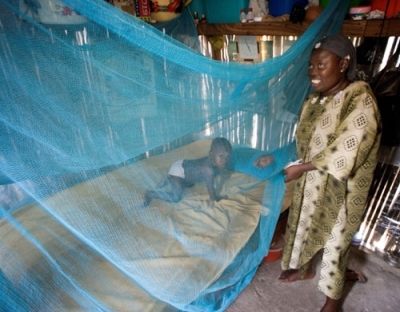World Malaria Day: Christians, Let's Help Eradicate This Disease

Malaria is a terrible disease that kills more than 445,000 people per year. The World Health Organization has implemented amazing programs to reach their goal to cut down on 40% of malaria-related deaths by 2020. But this progress has been slow in low-income countries like Haiti.
Malaria is transmitted through bites of female Anopheles mosquitos. The disease kills by attacking and infecting red blood cells and clogging capillaries that carry blood to vital organs. Mosquito nets and indoor residual spraying are the two best ways to prevent malaria.
I work for international non-profit LiveBeyond, based in Thomazeau, Haiti. Many of our Haitian friends don't have access to netting or spray for mosquito prevention. Haitians across the country don't even go into clinics when they are exhibiting symptoms of malaria. They complain of headaches and "night sweats," but don't make the connection that they could have malaria due to a lack of educational resources prevalent in all of Haiti. This is especially distressing considering LiveBeyond has the necessary medications to treat malaria in our clinic available at no cost to patients.
We at LiveBeyond are committed to educating the members of our community about malaria. We want to make sure that the people in our village recognize the warning signs for malaria and know to come to our clinic to get the treatment they need. We even hand out mosquito-netting when possible, thanks to generous donors.
Haiti accounts for almost 10% of malaria cases in Latin America. But Haiti has no internal funding source for malaria prevention. Haiti relies on international support for all of its malaria programs. Even the poorest of African nations has some of its own government funding dedicated to preventing the spread of the disease, accounting for great progress on that Continent. But the systemic poverty of Haiti, compounded by natural disasters, keeps this struggling island nation lagging behind the rest of the world.
Malaria is preventable and curable. As Christians, we should see this as a challenge. Jesus came to give life and give life abundantly (John 10:10). And while he saved us by His works, he created us for good works. "For we are his workmanship, created in Christ Jesus for good works, which God prepared beforehand, that we should walk in them." (Ephesians 2:10)
He has called us to good works like preventing and curing malaria. Christians and Christianity are negatively perceived in many parts of the world today, as many representing the faith have seemed more interested in converts that in meeting physical needs. But just imagine what the world would say about Christianity and Christians if we were instrumental in malaria treatment? Would we continue to be considered hypocrites? What would people begin to understand about God's love for humanity if we helped to eradicate diseases like malaria?
On World Malaria Day, let's let our lights shine before men so that they may see our good works and give glory to our Father in heaven. (Matthew 5:16) Many other faith-based organizations have joined us in these efforts, groups such as Samaritan's Purse and the Episcopal Church Relief and Development's Nets for Life program. With our faith and a common goal uniting us, there's no telling how much good we could do in Jesus' name, especially when it comes to trying to alleviate human suffering. Let's work together to #EndMalariaforGood!




























